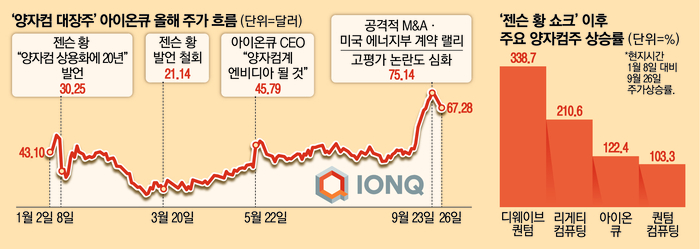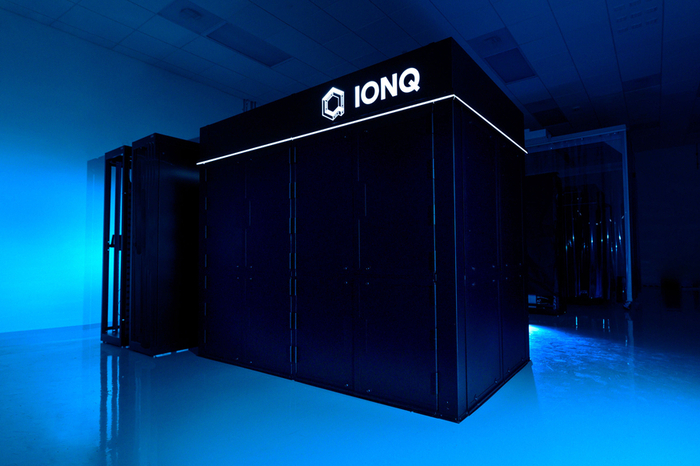IonQ, which surged 62% in a month, reported “growth reflection” vs. “overvalued” day after day, and Western academic ants are also divided
 사진 확대
사진 확대
As stocks related to quantum computers continued to rise despite extreme volatility, the “high valuation controversy” arose again. Some Western scholars even say, “IonQ sales are lower than Myeongnyun Jinsa ribs.”
According to the financial investment industry on the 28th, the market share of Quantum Com has jumped 62.4 percent in the past month. Its market capitalization is $21.7 billion (about 30 trillion won), which is larger than Kakao (26 trillion won).
On the other hand, IonQ’s sales in the last 12 months are only 52 million dollars (about 73 billion won). It is less than 1 percent of Kakao (7.7 trillion won) during the same period. It is only one-third of last year’s sales (242 billion won) of Myeongryundang (operator of Myeongryun Jinsa Galbi), which has recently appeared like a “meme.”
Due to the characteristics of growth stocks with high sales growth rates, it is common for the stock price sales ratio (PSR) to be high. However, it is pointed out that quantum computer stocks are trading at an overvalued price due to their excessively high PSR.
IonQ shares rose 122% compared to January 8, when they fell 39% in a day due to the “Jensen Huang Shock.” During the same period, Liggeti Computing rose 210%, and D-Wave Quantum rose more than 338%. These stocks rose to the top with similar stock prices drawing a similar trend.
Nvidia CEO Jensen Huang said at the beginning of the year, “It will take 15 to 20 years to commercialize quantum computers,” but later changed his position, saying, “The time for commercialization is approaching.” In fact, the recent moves by quantum computer manufacturers are raising expectations that they can advance the timing of commercialization.
IonQ signed a memorandum of understanding (MOU) with the U.S. Department of Energy on the 17th of this month for the development of space quantum technology. A day later, Regulatory Computing signed a $5.8 million (about 8.2 billion won) quantum networking technology contract with the U.S. Air Force Research Institute.
 사진 확대
사진 확대
There have also been cases in which financial giants have applied quantum computers to actual tasks to significantly increase productivity. HSBC announced on the 25th (local time) that it has increased the predictive power of the future price of bonds by 34% from the previous one through quantum computer technology. “This is a Sputnik moment in quantum technology,” said Philip Intalura, HSBC’s head of quantum technology. The quantum computer technology used in the HSBC project was developed by IBM. As a result, IBM shares rose 5.2% despite the weakness of the U.S. stock market on the 25th.
Big tech giants such as Alphabet (30.1 percent), Microsoft (22.2 percent), and IBM (29.3 percent) have all recorded higher share price increases than the S&P 500 (13.2 percent).
However, the high proportion of domestic investors is pointed out as an investment instability factor. This is because if investor sentiment deteriorates in Korea, the collapse of Seohak Ant’s foot could be repeated.
In the case of IonQ, Korean investors hold about 20% of all stocks. In the case of Tesla and Palantir, other preference states for Western ants, this ratio is in the 1-2% range. “As many investors are worried about losing opportunities (FOMO) to aggressive leaders recently, domestic investors’ interest in quantum computers is increasing,” said an ETF head of an asset management company.
In recent years, a confrontation structure has been formed even among Seohak ants. As the stock price of IONQ continued to rise, the net purchase of the IONQ Double Inverse Exchange Traded Fund (ETF) by domestic investors also increased.
Defiance Daily Target Double Short IonQ (IONZ) was the largest overseas listed ETF with a net purchase of $132.19 million from the 15th to the 26th. If the stock price of IONQ falls, it is a product that earns twice the profit of the fall. As IONQ shares exceeded Wall Street’s average price of $67.5, it is interpreted that Western scholars have increased their inverse bets.
On Wall Street, there are also mixed views on market share IONQ. Craig Ellis, a researcher at B Riley Securities, raised his target price from $75 to $100, saying, “IonQ is rapidly expanding its computing, networking, and space-related capabilities.” On the other hand, renowned investor Martin Shkreli refuted the optimism, saying, “IonQ is the best short selling target.”
